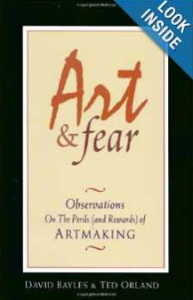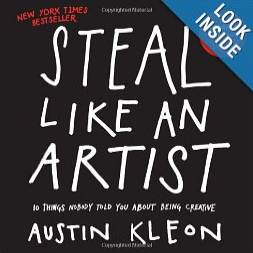I recently read Art & Fear: Observations On The Perils (And Rewards) of Artmaking by David Bayles and Ted Orland. Below are the quotes I found most interesting. As always, if you like the quotes, please click here to buy the book.
 “Art is rarely made by Mozart-like people – essentially (statistically speaking) there aren’t any people like that.” (i)
“Art is rarely made by Mozart-like people – essentially (statistically speaking) there aren’t any people like that.” (i)
“It’s easy to imagine that artists doubted their calling less when working in the service of God than when working in the service of self.” (2)
“We’ll side with Conrad’s view of fatalism: namely, that it is a species of fear – the fear that your fate is in your own hands, but that your hands are weak.” (3)
“Becoming an artist consists of learning to accept yourself, which makes your work personal, and in following your own voice, which makes your work distinctive.” (3)
“Even talent is rarely distinguishable, over the long run, from perseverance and lots of hard work.” (3)
“It suggests that our flaws and weaknesses, while often obstacles to our getting work done, are a source of strength as well.” (4)
“The viewers’ concerns are not your concerns (although it’s dangerously easy to adopt their attitudes). Their job is whatever it is: to be moved by art, to be entertained by it, to make a killing off it, whatever. Your job is to learn to work on your work.” (5)
“Virtually all artists spend some of their time (and some artists spend virtually all of their time) producing work that no one else much cares about.” (5)
“There’s generally no good reason why others should care about most of any one artist’s work. The function of the overwhelming majority of your artwork is simply to teach you how to make the small fraction of your artwork that soars.” (5)
“One of the basic and difficult lessons every artists must learn is that even the failed pieces are essential.” (6)
“Until your ship comes in, the only people who will really care about your work are those who care about you personally. Those close to you know that making the work is essential to your well being.” (6)
“”Artists don’t get down to work until the pain of working is exceeded by the pain of not working.” – Stephen DeStaebler” (9)
“Basically, those who continue to make art are those who have learned how to continue – or more precisely, have learned how to not quit.” (9)
“Operating manual for not quitting:
A. Make friends with others who make art, and share your in-progress work with each other frequently
B. Learn to think of [A], rather than the Museum of Modern Art, as the destination of your work. (Look at it this way: If all goes well, MOMA will eventually come to you.)” (12)
“Fears arise when you look back, and they arise when you look ahead.” (14)
“Lesson for the day: vision is always ahead of execution – and it should be.” (15)
“The artwork’s potential is never higher than in that magic moment when the first brushstroke is applied, the first chord struck. But as the piece grows, technique and craft take over, and imagination becomes a less useful tool. A piece grows by becoming a specific.” (15)
“Joan Didion said, “What’s so hard about that first sentence is that you’re stuck with it. Everythign else is going to flow out of that sentence. And by the time you’ve laid down the first two sentences, your options are all gone.” (16)
“Art is like beginning a sentence before you know its ending.” (20)
“Tolerance for uncertainty is the prerequisite to succeeding.” (21)
“Fears about yourself prevent you from doing your best work, while fears about your reception by others prevent you from doing your own work.” (23)
“But while you may feel you’re just pretending that you’re an artist, there’s no way to pretend you’re making art.” (26)
“Talent may get someone off the starting blocks faster, but without a sense of direction or a goal to strive for, it won’t count for much.” (27)
“The world is filled with people who were given great natural gifts, sometimes conspicuously flashy gifts, yet never produce anything. And when that happens, the world soon ceases to care whether they are talented.” (27)
“Whatever they have is something needed to do their work – it wouldn’t help you in your work even if you had it. Their magic is theirs. You don’t lack it. You don’t need it. It has nothing to do with you.” (34)
“At any given moment the older work is always more attractive, always better understood.” (39)
“Simply courting approval, even that of peers, puts a dangerous amount of power in the hands of the audience. Worse yet, the audience is seldom in a position to grant (or withhold) approval on the one issue that really counts – namely, whether or not you’re making progress in your work. They’re in a good position to comment on how they’re moved (or challenged or entertained) by the finished product, but have little knowledge or interest in your process. Audience comes later. The only pure communication is between you and your work.” (47)
“Naive passion, which promotes work done in ignorance of obstacles, becomes – with courage – informed passion, which promotes work done in full acceptance of those obstacles.” (50)
“Your reach as a viewer is vastly greater than your reach as a maker. The art you can experience may have originated a thousand miles away or a thousand years ago, but the art you can make is irrevocably bound to the times and places of your life.” (52)
“Working within the self-imposed discipline of a particular form eases the prospect of having ot reinvent yourself with each new piece.” (60)
“Fear that you’re not getting your fair share of recognition leads to anger and bitterness. Fear that you’re not as good as a fellow artist leads to depression.” (72)
“The dilemma facing academia is that it must accommodate not only students who are striving to become artists, but also teachers who are struggling to remain artists.” (80)
“An artist who teaches will eventually dwindle away to something much less: a teacher who formerly made art.” (82)
“Most people stop making art when they stop being students.” (85)
“The security of a monthly paycheck mixes poorly with the risk-taking of artistic inquiry.” (88)
“What we really gain from the artmaking of others is courage-by-association. “ (90)
“Writer Henry James once propose three questions you could productively put to an artist’s work: The first two were disarmingly straightforward: What was the artist trying to achieve? Did he/she succeed? The third’s a zinger: Was it worth doing?” (93)
“We do not long remember those artists who followed the rules more diligently than anyone else. We remember those who made the art from which the “rules” inevitably follow.” (95)
“Art made primarily to display technical virtuosity is often beautiful, striking, elegant… and vacant.” (96)
“Compared to other challenges, the ultimate shortcoming of technical problems is not that they’re hard, but that they’re easy.” (96)
“The net result is that the art is less polished – but more innovative – than craft.” (98)
“One real difference between art and craft: with craft, perfection is possible.” (98)
“New work is supposed to replace old work. If it does so by making the old work inadequate, insufficient and incomplete – well, that’s life.” (99)
“Old work tells you what you were paying attention to then; new work comments on the old by point out what you were not previously paying attention to.” (100)
“Most early work, in fact, only hints at the themes and gestures that will – if the potential isn’t squandered – emerge as the artist’s characteristic signature in later, mature work.” (102)
“Style is the natural consequence of habit.” (103)
“Science advances at the rate that technology provides tools of greater precision, while art advances at the pace that evolution provides minds with greater insight – a pace that is, for better or worse, glacially slow.” (104)
“Art is something you do out in the world, or something you do about the world, or even something you do for the world.” (108)
“Viewed over a span of years, changes in one’s art often reveal a curious pattern, swinging irregularly between long periods of quiet refinement, and occasional leaps of runaway change.” (110)
“Over the long run, the people with the interesting answers are those who ask the interesting questions.” (113)
“The only work really worth doing – the only work you can do convincingly – is the work that focuses on the things you care about.” (116)
“Art is hard because you have to keep after it so consistently.” (118)
If you liked the quotes above, click here to buy the full book.





